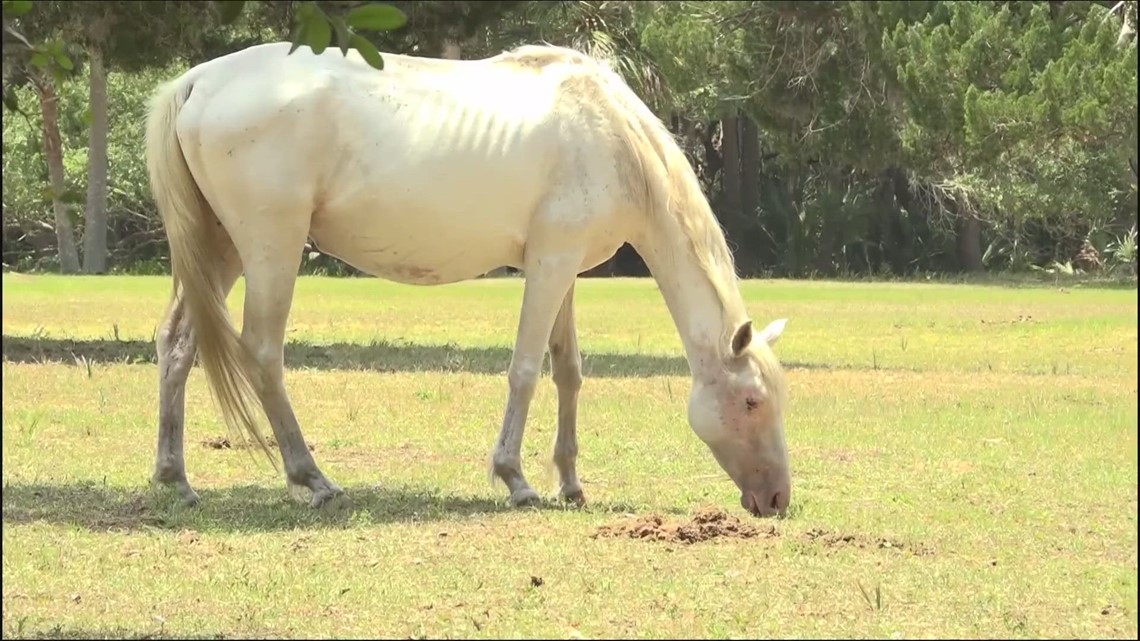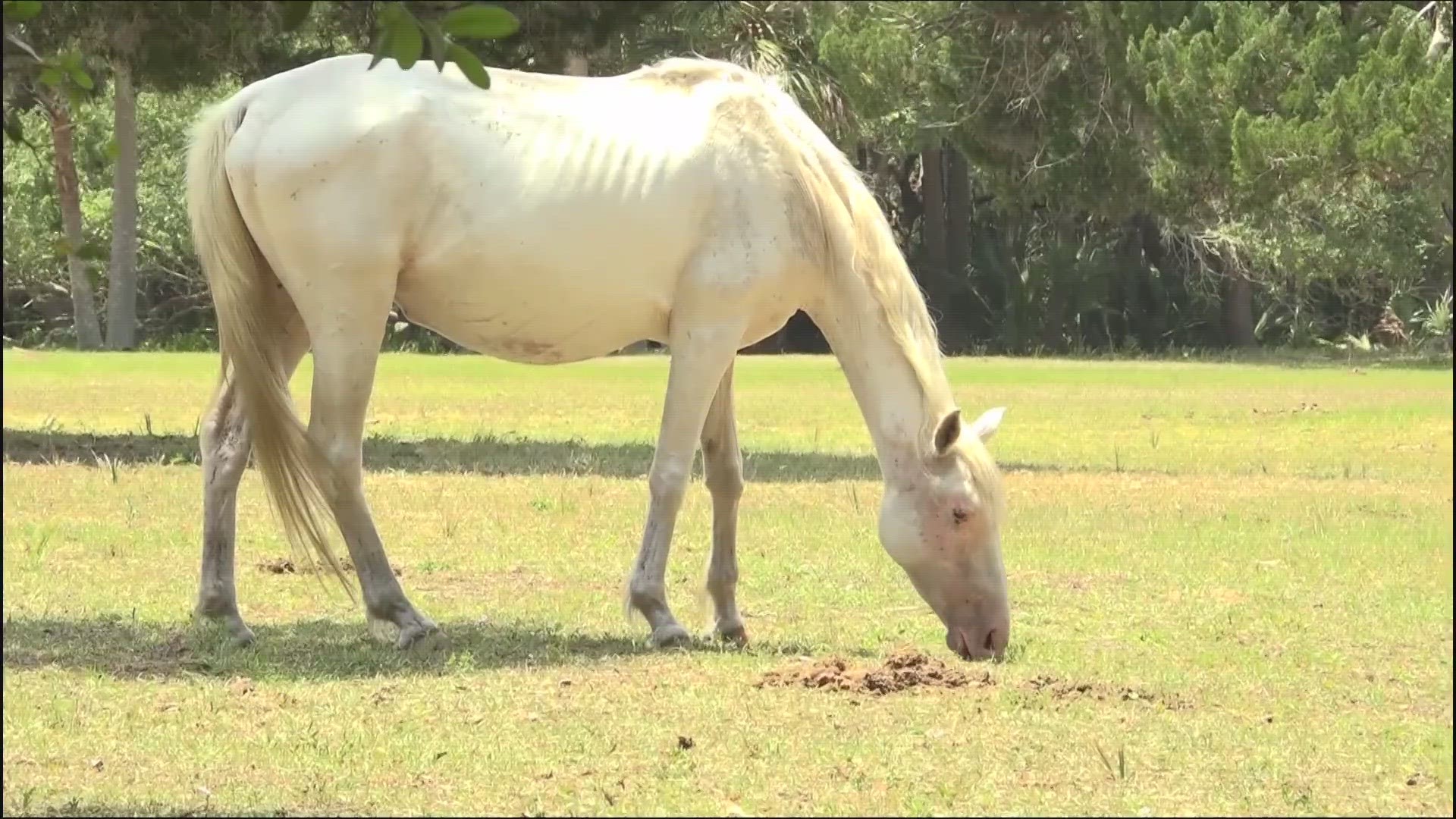CAMDEN COUNTY, Ga. — Cumberland Island in Georgia is known for its pristine wilderness and feral horses. But are the horses in bad shape?
A legal fight is brewing between people concerned for the horses and the state and federal government.
The only way to get there is by boat or private plane. People visit the Cumberland Island National Seashore every day to see the natural vistas and especially the horses. Those feral horses roam all over the island, free as birds.
But there’s something most visitors don’t see, and it's right in front of them.
Carol Ruckdeschel pointed to a horse nearby, "Look at that one. She's just emaciated."
It looked thin. She says the horses are hungry.
"I felt sorry for them," Ruckdeschel said. "There’s just not that much for them to eat."
Ruckdeschel knows Cumberland and its feral horses. She’s lived on the island for 50 years. Described as the wildest woman in America, Ruckdeschel is a naturalist. She surveys the island’s wildlife weekly and some of it every day.
She explained that seeing a horse’s ribs does not mean it’s malnourished. But when the hip bones are sticking out, Ruckdeschel said that’s a sign of not having enough to eat."
"They’re not woodland animals at all. They’re for the open plains," she said.
There are only a couple open areas on Cumberland, so the horses go into the woods and the marshes as well looking for food, she's noticed over the decades.
"I’ve seen them sink in the mud so badly, that they couldn’t get out, and the tide came in and killed them," Ruckdeschel said. "It’s that kind of simple thing you don’t think about."
She’s seen horses die with their hungry babies as well as get stuck between trees.
Ruckdeschel said the island is bad for the horses, and the horses are bad for the island. An example is when the horses go into the marsh, looking for food.
"It’s bad for the ecosystem," she said. "It’s his feet, his weight. It tears up the whole substrate. It kills everything living in (the marsh)."
Ruckdeschel says horses also hurt endangered sea turtle hatchlings.
"They would just stomp on the babies. They wouldn’t know. None of this is the horses’ fault," she said.
Not all the horses look bad.
"Of course, a young female is going to look good, and the stallions look good," she noted.
But Ruckdeschel has observed that the mares are often always pregnant… which amps up their need and search for food.
The horses are not native to Cumberland Island. People brought horses here over the years. According to the Park Service, the Carnegie's were the last folks to bring horses to the island in the 1880s. By the time the national park service arrived at the island in 1972, the horses were feral.
Ruckdeschel and others are suing the National Park Service and other federal and state agencies over the very issues.
The lawsuit argues the government agencies have failed to follow some of their own rules and regulations that protect the island and its more than 100 horses. Court documents state the island’s horses’ life expectancy is a third of that of a domestic horse.


The Georgia Equine Rescue League is one of the plaintiffs. Patty Livingston leads the organization. She told First Coast News that other barrier islands in the U.S. -- with feral horses -- have programs in place to care for horses.
Livingston said, "They’re feeding the horses. They're vetting them." She said one herd even has an equine expert check the horses' teeth.
The National Park Service’s website states “Cumberland has the only herd of feral horses on the Atlantic coast that is not managed (no food, water, veterinary care, or population control).”
The NPS website also acknowledges the horses have adversely impacted wildlife and vegetation.
First Coast News reached out to all the defendants in the lawsuit for comment. They said they do not comment on pending litigation. The park service further added, "The National Park Service and the Cumberland Island National Seashore staff are committed to managing the park’s natural and cultural resources consistent with our authorities."
No doubt the horses are a draw for visitors.
Tourist Casey Joye smiled, "Sharks teeth and horses! Those are the two reasons we came!" She added, "They look sad, though."
Pat Hughes nodded, "I feel like (the horses) are a cool part of the attraction."
Ruckdeschel said many people think that, "because they’re free, they’re enjoying a wonderful happy existence."
But she added that often visitors who know about horses actually see beyond the horses’ mystique on the island. So what do Ruckdeschel and Livingston think is the best thing for the horses?
Ruckdeschel calmly said, "To find a humane way to get them off this island."
Livingston told First Coast News, "Initially in this lawsuit, what we’re demanding is that be fed immediately." And she agreed, eventually the horses should be removed from the island.
The horses of Cumberland are a living part of the island's past life, when animals were livestock and maintained. But theyre on their own now.
Would as many people visit Cumberland if the horses weren’t there? Many people want to keep them on the island.
"But we’ve got to realize that we’ve taken a species that is so ill-fit for here and put them here," Ruckdeschel said, "and now we want to keep them for our viewing pleasure… which just doesn’t seem right."
So as tourists – many who came to see the horses -- depart from the island on the ferry at the end of the day, Ruckdeschel remains, and the horses stay too.
Free to roam but unable to leave.

